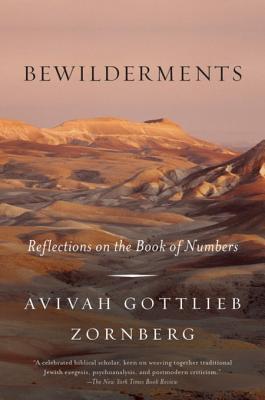
Bewilderments
Reflections on the Book of Numbers
کتاب های مرتبط
- اطلاعات
- نقد و بررسی
- دیدگاه کاربران
نقد و بررسی

December 8, 2014
Also known as Bamidbar, which is Hebrew for in the wilderness (hence the title Bewilderments), the Bible’s book of Numbers may seem an assortment of stories and legal texts. Zornberg (The Murmuring Deep: Reflections on the Biblical Unconscious), however, argues that it coheres as the story of a tragedy. Poised to enter the promised land at the beginning of the book, the Israelites suddenly lose that right, and the generation that left Egypt is be doomed to end their lives wandering in the desert. On another level, though, that wilderness can be seen as the place of Israel’s spiritual odyssey, where its people gain their voice and learn to trust God. Zornberg’s grasp of the rabbinic interpretations of the text (as well as Jewish philosophy generally) is masterful, and the meat of her work—which is at times dense and more for savoring than breezing through—is in relating these interpretations to the spiritual and psychological questions, or bewilderments, evoked by the book of Numbers. Agent: Sharon Friedman, Sharon Friedman Literary Agency.

December 15, 2014
An exploration of the book of Numbers, the penultimate of the Hebrew Bible, a strange and edifying story of the passing of an entire generation while the Israelites wandered toward the Promised Land. The book of Numbers opens and ends with a census of the emigrants from Egypt, hence the title. In Hebrew, it is known as "In the Wilderness," descriptive of the 40 years' sojourn in the desert. It focuses on the start and finish of the journey that forged a nation. Continuing her series on the books of the Bible, National Jewish Book Award winner Zornberg (The Murmuring Deep: Reflections on the Biblical Unconscious, 2011, etc.) presents a provocative exegesis of the salient points of the Numbers narrative. She considers ancient legal matters (the laws of adultery and the rights of women to claim legacies), the skeptical complaints of the wanderers (on the pretext of a meat shortage), and the rebellion of Korach, a kinsman of Moses. The author carefully deliberates on the meaning of Moses striking the rock to bring forth water. He also examines the odd parable of Balaam, a gifted speaker and diviner. This is not a simple retelling of Numbers but rather a Talmudic commentary of a high order based on artful Hebrew prose and poetry-and it is challenging. In order to draw out hidden messages, Zornberg employs lexicographical points, homonyms and double meanings. She displays her own superior hermeneutic skills as she calls on the teachings of vaunted rabbinic authority, Midrashic tradition and the homilies of Hasidic masters. The author frequently cites Rashi and the Ramban, as well as more modern thinkers, including Rilke, Proust, T.S. Eliot, Sigmund Freud and Walter Benjamin. Throughout, Zornberg incorporates psychiatry, philosophy and world literature into the study of Holy Writ. A powerful, important textual deconstruction of the mystical fourth book of the Old Testament.
COPYRIGHT(2014) Kirkus Reviews, ALL RIGHTS RESERVED.

March 1, 2015
The subtitle of Zornberg's latest Torah commentary is a full disclosure of what manner of book it isa work of literary analysis that draws on the direct and tangential reactions of poets and physician-philosophers of the psyche as well as rabbinic scholars to the text under considerationa range that encompasses Rashi and T. S. Eliot, Ramban and Rilke. A few biblical verses blossom into a bouquet of provocative and enlightening (or complicating) insights in each large chapter, well managed by Zornberg but altogether so rich that the entire volume demands larger investments of reading time and mental energy than many will want to make. The intent is to wrestle with, if not dispel, the bewilderments of the book of Numbers, whose Hebrew title translates literally as the book of in-the-wilderness that is, of the 40 years Israelites led by Moses wandered before entering the Promised Land. Why all that enforced tarrying? Perhaps, to learn how to be a people of God and how to be faithful to God?(Reprinted with permission of Booklist, copyright 2015, American Library Association.)

























دیدگاه کاربران